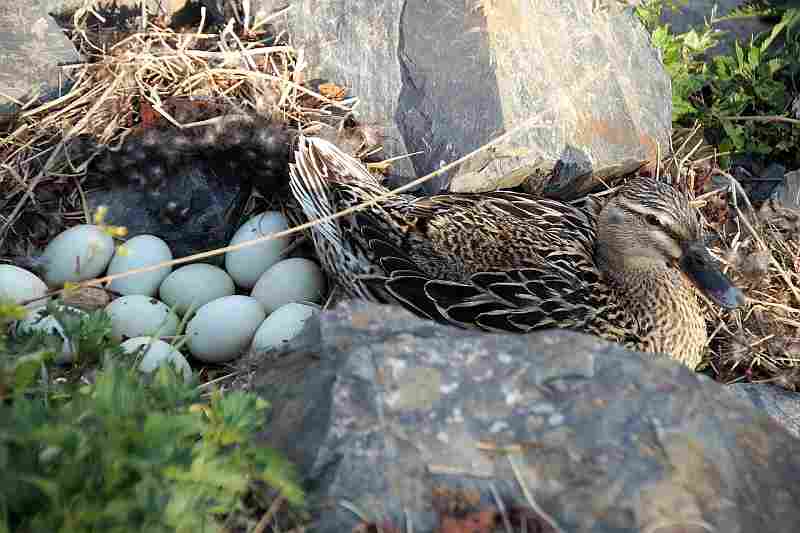Just as the early bird catches the worm, the timing of when ducks start laying eggs can be quite the puzzle for new duck owners. You’ve likely noticed the complexity of factors that influence egg production, ranging from the ducks’ maturity to the amount of daylight they’re exposed to.
While understanding these elements is important, you might wonder about the essential diet that guarantees a healthy laying cycle or how seasonal changes impact their ability to lay consistently. Unraveling these mysteries enhances your ducks’ well-being and maximizes their egg-laying potential, inviting a closer look into the nuances of avian care.
Understanding Duck Maturity
Most ducks reach maturity and begin laying eggs at about 4 to 7 months of age, depending on the breed and environmental factors. Breeding habits play a vital role in this development.
As you explore understanding duck maturity, it’s essential to grasp gender identification, which greatly influences breeding dynamics. Female ducks, known for their distinctive quack, differ from males, who often have a softer, raspier sound. Recognizing these differences is critical to managing breeding effectively. Additionally, physical characteristics such as plumage color and patterns can help identify gender as ducks mature.
This knowledge not only aids in breeding practices but also in anticipating when your ducks will start laying eggs, marking an important milestone in their development cycle.
The Role of Daylight
Understanding the differences in gender and maturity is essential, but it’s equally critical to ponder how daylight impacts duck egg production. Daylight plays a pivotal role in regulating the reproductive behaviors of ducks. Their egg-laying cycles are closely tied to the length of the day, with longer daylight hours typically stimulating higher egg production.
- Light pollution: Can disrupt natural laying cycles by mimicking longer daylight hours.
- Moon phases: May affect nocturnal light levels, subtly influencing egg-laying patterns.
- Seasonal changes: Winter shorter days often result in decreased egg production.
- Artificial lighting: Used strategically can mimic longer days, encouraging ducks to lay more eggs.
Understanding these factors is crucial to manage and optimize egg production effectively, considering the balance between natural cycles and human intervention.
Optimal Diet for Egg Production
You’ll find that a duck’s diet profoundly affects its egg production capabilities. Research shows that incorporating essential nutrients, using recommended feed types, and adding supplemental food items can greatly enhance egg yield.
Let’s explore how these dietary components work together to optimize your ducks’ egg-laying potential.
Essential Nutrients
Incorporating a balanced diet rich in specific nutrients is essential to maximize egg production in ducks. This supports ideal egg production, enhances feather quality, and encourages healthy mating behaviors, critical for a productive breeding season.
Research indicates that a well-rounded diet should include:
- Proteins: Essential for growth, reproduction, and overall health.
- Calcium: Critical for strong eggshells and skeletal health.
- Vitamins A and E: Support immune system health and feather quality.
- Omega-3 fatty acids: Improve egg quality and are beneficial for the ducks’ cardiovascular health.
Recommended Feed Types
Selecting the right feed types is essential for optimizing egg production in ducks, as their dietary needs must be met with precision to assure the highest quality and quantity of eggs. Your ducks’ feeding schedule should include consistent, balanced meals, providing all necessary nutrients daily. Water availability is equally vital; guarantee they have constant access to clean water, which aids digestion and egg production.
| Feed Type | Benefits |
|---|---|
| Layer Pellets | High in calcium, promotes strong eggshells |
| Grains (corn, wheat) | Provides energy, supports overall health |
| Greens (lettuce, spinach) | Rich in vitamins, enhances yolk quality |
Adhering to a proper feeding schedule and maintaining water availability are key to maximizing the health and productivity of your ducks.
Supplemental Food Items
Incorporating supplemental food items into your ducks’ diet can greatly boost egg production by thoroughly fulfilling their nutritional requirements. Overcoming feeding challenges requires a balanced approach, ensuring your ducks have access to diverse nutrients critical for the best egg production. It’s crucial to think about:
- Calcium sources: Like oyster shells, to strengthen eggshells.
- Protein-rich foods: These include mealworms or fish meal to support egg development.
- Greens and vegetables: Offering vitamins and minerals.
- Clean, accessible water sources: Crucial for hydration and health.
Ensuring these supplements are part of their diet addresses feeding challenges and promotes healthier, more productive ducks. Remember, water sources should be plentiful and clean, supporting overall wellbeing and aiding in the digestion of these supplemental food items.
Recognizing Health and Wellness
Ensuring your ducks maintain peak health and wellness is essential for them to start laying eggs at the appropriate age. Focusing on disease prevention and stress management is critical to their overall well-being. Implementing regular health checks can identify potential issues early, reducing the risk of diseases that could hinder their egg-laying capabilities. Vaccinations and maintaining a clean, safe environment are key strategies in disease prevention.
Stress management is equally important. Ducks are sensitive to changes in their environment and social stressors. Ensuring they have enough space, access to clean water, and are not overcrowded can significantly reduce stress levels. Remember, a stressed duck is less likely to lay eggs efficiently. By prioritizing these aspects, you will support their health and optimize their egg production.
Seasonal Impact on Laying
You’ll find that the season greatly influences when ducks begin laying eggs, with spring acting as a major trigger.
Temperature plays a vital role, as warmer conditions often stimulate egg production.
Additionally, the amount of daylight hours directly impacts their laying cycle, highlighting the importance of natural light in their reproductive processes.
Spring Trigger for Laying
As daylight hours increase in spring, ducks start laying eggs due to hormonal changes prompted by the extended exposure to light. This seasonal shift greatly influences their reproductive system, aligning egg production with the most favorable conditions for raising offspring. The spring trigger is a fascinating interplay of environmental cues and biological responses, deeply rooted in the ducks’ migratory patterns and nesting behavior.
- Migratory Patterns: Ducks adjust their locations based on seasonal changes, optimizing conditions for laying and hatching.
- Nesting Behavior: Spring’s increased daylight encourages nest building, a precursor to egg laying.
- Hormonal Changes: Longer days stimulate hormonal activities, directly impacting egg production.
- Environmental Cues: Ducks are finely tuned to the onset of spring, using it as a signal to commence laying.
Temperature’s Role in Laying
Beyond the influence of daylight, temperature plays a vital role in determining when ducks begin their egg-laying process. As temperatures rise in late winter and early spring, ducks’ bodies respond to the warmer weather by preparing for breeding. This preparation includes finding suitable nesting sites, influenced by the ambient temperature. Warmer temperatures signal the availability of nesting materials and the presence of open water, both critical for successful breeding behavior.
Furthermore, temperature fluctuations can impact the timing and success rate of egg-laying. Ducks prefer laying eggs in a stable, warm environment, ensuring the eggs’ healthy development. In regions where temperatures rise consistently early in the year, ducks may start their egg-laying process sooner, adapting their breeding behavior to the climate’s cues.
Daylight Hours Influence
While temperature greatly influences when ducks start laying eggs, the amount of daylight they’re exposed to also plays a pivotal role in their egg-laying cycle. Light serves as a trigger for hormonal changes that stimulate egg production. However, this natural process can be affected by several factors:
- Light pollution: Artificial lighting can disrupt ducks’ natural rhythms, potentially leading to irregular laying patterns.
- Seasonal changes: Longer days in spring and summer naturally stimulate egg production.
- Geographical location: Ducks living closer to the equator may experience less seasonal variation in daylight, affecting their laying cycle.
- Genetic factors: Some breeds are more sensitive to changes in daylight, influencing their productivity.
Understanding these aspects helps manage and optimize egg production in domestic ducks, ensuring their health and wellbeing.
Encouraging Consistent Egg Laying
To encourage consistent egg laying in ducks, it’s vital to maintain ideal living conditions and a balanced diet. Proper nesting arrangements play an important role. Provide ample, secluded nesting boxes that mimic natural environments to make ducks feel safe and secure. This not only encourages them to lay eggs but also to do so more regularly.
Additionally, predator protection can’t be overstated. Ducks need to feel safe from predators at all times. Implement secure fencing and consider guardian animals if feasible. Predators can stress ducks, significantly reducing their egg-laying capabilities.
Frequently Asked Questions
How Does the Breed of the Duck Influence the Age at Which They Start Laying Eggs?
The breed of the duck significantly influences when they’ll start laying eggs due to genetic predisposition and nutritional requirements. Research shows that certain breeds mature faster, requiring tailored diets to meet their specific needs.
Can Environmental Stressors Outside of Daylight and Season Affect a Duck’s Egg-Laying Capabilities?
Yes, environmental stressors like predator presence and nutritional deficits can indeed affect a duck’s egg-laying capabilities. Studies show that stress can reduce egg production by up to 30%, highlighting the importance of a stress-free environment.
How Do Ducks’ Egg-Laying Patterns Change as They Age?
As ducks age, their egg-laying patterns shift due to dietary impacts and genetic factors. You’ll find they lay fewer eggs, and these changes are deeply influenced by their diet and inherited traits.
Are There Any Natural or Homemade Supplements That Can Enhance a Duck’s Egg-Laying Frequency?
Yes, dietary adjustments and vitamin supplementation can boost a duck’s egg-laying frequency. Incorporating calcium-rich feed and providing access to natural sunlight for vitamin D can greatly improve their productivity in a scientifically supported manner.
How Does the Presence of a Drake (Male Duck) in the Flock Impact the Hens’ Egg-Laying Behaviors?
Having a drake in your flock can alter hen’s egg-laying behaviors. Research shows drake behavior influences flock dynamics, sometimes boosting egg production. However, monitoring for any signs of stress or aggression is crucial.
Conclusion
Your ducks will start laying eggs when they’re mature, well-fed, and basking in enough daylight.
Remember, ‘you reap what you sow,’ so providing a prime diet and ensuring their health is paramount.
Seasons will sway their laying patterns, but with the right care, you can encourage consistency.
It’s a delicate balance of nature and nurture, proving that with diligent care and attention, your ducks won’t only thrive but also reward you with a bountiful egg harvest.

